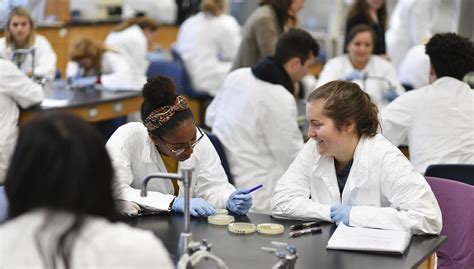The University of Illinois at Urbana-Champaign (UIUC) offers a renowned pre-medical program that has consistently produced exceptional graduates who go on to pursue successful careers in medicine. Here’s a comprehensive guide to help you navigate the UIUC pre-med journey:

Coursework and Curriculum
UIUC’s pre-medical curriculum is designed to provide a solid foundation in science and humanities. Required courses include:
- Biological Sciences: Biology, Chemistry, Physics, Organic Chemistry, Biochemistry
- Humanities and Social Sciences: English, Mathematics, Psychology, Sociology
- Pre-Medical Electives: Genetics, Cell Biology, Human Anatomy and Physiology
GPA and MCAT Scores
Maintaining a high GPA is crucial for pre-med students. According to the American Association of Medical Colleges (AAMC), the median GPA for matriculants to medical school in 2022 was 3.78. UIUC provides resources such as the Undergraduate Research Scholars Program to support students in achieving academic success.
The Medical College Admission Test (MCAT) is another vital component of the pre-med journey. The AAMC reported an average MCAT score of 514 for matriculants in 2022. UIUC offers the MCAT Preparation Program, which provides students with access to practice materials, workshops, and expert guidance.
Pre-Med Activities and Experiences
Beyond academic coursework, pre-med students at UIUC are encouraged to engage in extracurricular activities that demonstrate their commitment to medicine and healthcare. These include:
- Volunteer Work: Clinical, research, or community service experiences
- Research: Participating in laboratory or clinical research projects
- Shadowing Physicians: Observing physicians in various medical settings
- Medical Organizations: Joining clubs such as the Pre-Health Professions Club or the Global Health Initiative
Selecting the Right Major
UIUC offers several majors that are well-suited for pre-med students. These include:
- Biology
- Biochemistry
- Cell and Structural Biology
- Chemistry
- Physiology and Neurobiology
Choosing the right major depends on your specific interests and career goals.
Timeline for Medical School Application
- Freshman and Sophomore Years: Focus on coursework and extracurricular activities.
- Junior Year: Prepare for the MCAT and finalize the medical school application list.
- Senior Year: Submit applications, attend interviews, and make a final decision about medical school.
Resources and Support
UIUC provides a wide range of resources and support for pre-med students, including:
- Pre-Health Professions Office: Advising, academic planning, and career counseling
- Student Health Professions Association: Peer support and networking
- Health Professions Scholars Program: Mentorship, research opportunities, and financial support
- Cradle-to-Career Mentorship Program: Guidance from faculty mentors
Tips for Success
- Start early: Begin planning for medical school as early as possible.
- Stay organized: Keep track of your coursework, extracurricular activities, and medical school applications.
- Seek support: Utilize the resources and support provided by UIUC.
- Be resilient: The pre-med journey can be challenging. Stay positive and persevere through adversity.
- Follow your passion: Pursue activities and experiences that you are genuinely passionate about.
Frequently Asked Questions
Q1. What is the acceptance rate for UIUC’s pre-med program?
A1. UIUC does not have a specific pre-med program, but the acceptance rate for the University of Illinois College of Medicine at Urbana-Champaign was 3.4% in 2022.
Q2. What is the average time it takes to complete the pre-med curriculum at UIUC?
A2. Most pre-med students complete their undergraduate degrees in four years.
Q3. What are the most common majors for pre-med students at UIUC?
A3. Biology, Biochemistry, Cell and Structural Biology, Chemistry, and Physiology and Neurobiology are the most popular majors for pre-med students.
Q4. Does UIUC offer a pre-med advising program?
A4. Yes, UIUC’s Pre-Health Professions Office provides comprehensive advising and support for pre-med students.
Q5. What are some extracurricular activities that I should consider for my pre-med application?
A5. Volunteering, research, shadowing physicians, and joining medical organizations are all valuable extracurricular activities for pre-med students.
Q6. How can I improve my chances of getting into medical school?
A6. Maintain a high GPA, score well on the MCAT, engage in meaningful extracurricular activities, and seek guidance from mentors and advisors.
Table 1: Required Pre-Medical Courses at UIUC
| Course | Units |
|---|---|
| Biology | 16 |
| Chemistry | 16 |
| Physics | 8 |
| Organic Chemistry | 8 |
| Biochemistry | 4 |
| Math | 8 |
| English | 8 |
| Psychology | 3 |
| Sociology | 3 |
Table 2: UIUC Pre-Medical Resources
| Resource | Description |
|---|---|
| Pre-Health Professions Office | Academic advising, career counseling, resources |
| Student Health Professions Association | Peer support, networking, events |
| Health Professions Scholars Program | Mentorship, research opportunities, financial support |
| Cradle-to-Career Mentorship Program | Guidance from faculty mentors |
| Campus Recreation Center | Fitness facilities, group classes, intramurals |
Table 3: Steps for Applying to Medical School
| Step | Action |
|---|---|
| Freshman-Sophomore Years | Maintain a high GPA, engage in extracurricular activities, plan for the MCAT |
| Junior Year | Prepare for the MCAT, create a medical school application list |
| Summer Before Senior Year | Complete primary applications, submit secondary applications |
| Senior Year | Attend interviews, make a final decision about medical school |
Table 4: Pros and Cons of UIUC’s Pre-Medical Program
| Pros | Cons |
|---|---|
| Strong academic reputation | Large university setting |
| Excellent resources and support | Competitive admissions process |
| Wide range of extracurricular opportunities | Less personal attention than smaller colleges |
| Close proximity to medical facilities | Can be expensive compared to other schools |
